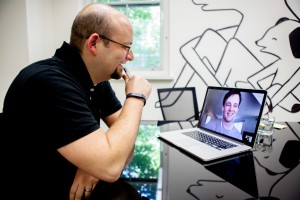 If you’ve never been on an interview before, you might not know what to expect and that can be nerve racking. Then again, people who have been on several interviews may still find themselves jittery before hand. While it’s natural, and perhaps even good, to be a little nervous for your interview, you’ll still want to mentally prepare yourself and build your confidence before heading in.
If you’ve never been on an interview before, you might not know what to expect and that can be nerve racking. Then again, people who have been on several interviews may still find themselves jittery before hand. While it’s natural, and perhaps even good, to be a little nervous for your interview, you’ll still want to mentally prepare yourself and build your confidence before heading in.
Take a Drive A day or two before your interview, drive there.
It might sound like a weird thing to do, but trust me, it will reduce your anxiety. There’s nothing worse than being stricken with panic on your way to an interview when you suddenly realize you have no idea where you’re going. By mapping your route before hand, you’ll be more familiar with traffic patterns, the parking situation and the amount of time it actually takes to get there. On the day of your interview, it will be one less stressor to deal with.
Mock Interview Recruit a parent, sibling, school counselor or someone else you know has been on interviews.
Provide them with a list of questions to ask you, but also invite them to ask you additional questions off the cuff. Why? Well, an interview is a balancing act. You’ll have some answers prepared for the more traditional questions, but you’ll also need to be ready to answer curve ball questions. The interviewer will look for you’re ability to think on your feet and how you perform under pressure.
Go through this process a few times and with different people if you can. The more you practice, the better and more eloquently you’ll find your responses, even on the really tough questions. Practicing your interview skills will build your confidence and in turn, you’ll be much more composed for the real deal.
Practice Tranquility An up-coming interview can create a lot of stress—schedule down time for yourself.
The night before and the morning of, spend five to ten minutes sitting quietly or with soft music if you prefer, but no phone, tablet, or other distractions. Close your eyes and take deep breaths. Let your worries melt away, maybe even use a mantra— try a phrase to raise your self-esteem and confidence like, “I am who they want to hire.”
Get Organized Get your materials together.
Getting organized will help your mind slow down. Have a crisp folder with at least three resumes and three copies of references inside. You may also want to bring a professional portfolio with relevant samples of work or writing examples. Just by walking in with a folder or binder, you’ll walk taller and feel a whole lot more confident.
These tips will help get you started to a successful interview. For additional interview information take Next Step Academy’s Interviewing Skills course which you can find right here!
 Prioritize networking. Now is the perfect time to connect with people in your professional network. Who you know is going to be important when trying to establish and build your career. Ask business acquaintances out to coffee (quick, before peppermint mochas go away!) or use sites like Meetup.com to look for local professional events you can attend.
Prioritize networking. Now is the perfect time to connect with people in your professional network. Who you know is going to be important when trying to establish and build your career. Ask business acquaintances out to coffee (quick, before peppermint mochas go away!) or use sites like Meetup.com to look for local professional events you can attend. 




